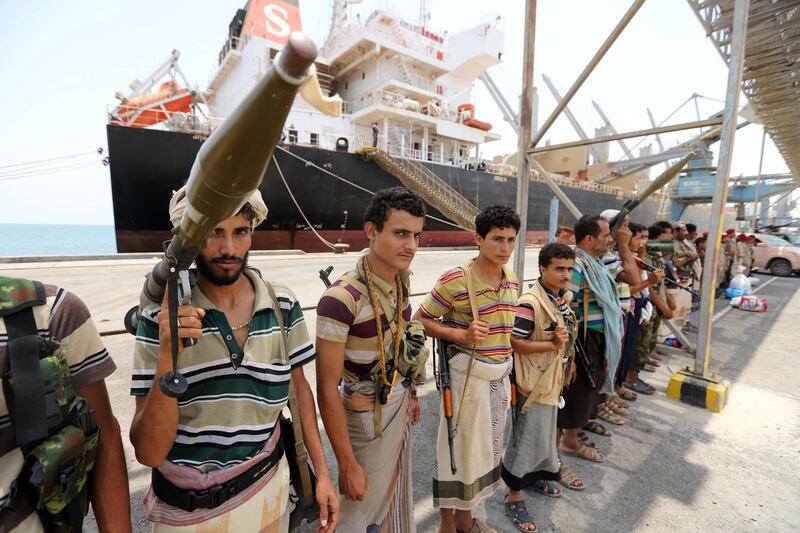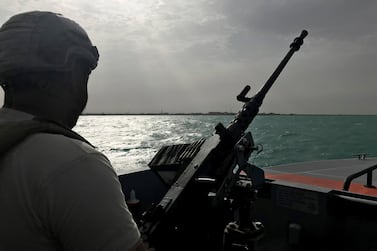Yemen's warring parties entered into new United Nations-sponsored talks in Jordan on Monday, Yemeni officials said, two days after Houthi forces began withdrawing from the ports of Hodeidah, breaking a six month stalemate.
The talks will focus on sharing out revenues from Hodeidah's three Red Sea ports to help relieve an urgent humanitarian crisis, they said.
The Iran-aligned Houthi group began to unilaterally pull out from the ports of Saleef, Ras Isa and Hodeidah on Saturday, handing them over to UN-supervised local forces as agreed under a pact with the Saudi-backed government last December in Stockholm, Sweden, that had stalled for months.
"The UN and its special envoy are sponsoring talks in Amman...to discuss the issue of salaries and to make the economic situation neutral," Mohammed Ali Al Houthi, head of the Houthis' Supreme Revolutionary Committee, said in a tweet.
A Yemeni government official confirmed the talks to Reuters. A UN official said the office of UN envoy Martin Griffiths was facilitating the meeting.
Hodeidah, the main entry point for Yemen's commercial and aid imports, became the focus of the four-year conflict last year when the Saudi-led coalition tried twice to seize the port to cut off the Houthis' main supply line.
Under the Stockholm agreement for a truce and troop withdrawal by both sides from Hodeidah, the ports' revenues would be gathered in the Hodeidah branch of the central bank to help pay public wages.
The war has devastated Yemen's economy, exacerbating an urgent humanitarian crisis with millions of Yemenis on the brink of starvation.
Soaring prices have put basic commodities out of reach for many Yemenis and the central bank has struggled to pay public-sector salaries as foreign exchange reserves evaporated.
The United Nations will help in the management of the Hodeidah ports, which will be under control of Yemen's Red Sea Port Corporation and local coast guards, and assist in inspection of ships.
The Sunni Muslim military alliance led by Saudi Arabia and the United Arab Emirates intervened in Yemen in 2015 to try to restore the internationally recognised government of Abdrabbu Mansour Hadi, which was ousted from power in Sanaa in late 2014 by the Houthi movement.
A minister in the Yemeni government dismissed the Houthi pullout of Hodeidah as a “show” meant to “misinform the international community”.
"It's an attempt to misinform the international community ahead of a meeting of the U.N. Security Council" on Yemen, Yemeni Information Minister Muammar Al Iryani said. "A group of (Houthi) militiamen left and they were replaced by others wearing coast guard police uniforms."
But government negotiator Sadiq Dweid acknowledged it marked the start of implementing the Stockholm accord.
He tweeted late on Saturday that he had held a positive meeting with the chief UN observer, agreeing that the pullout should lead to time frames for implementing a UN mechanism for inspecting ships, de-mining and removing military installations.
The UN Redeployment Coordination Committee (RCC) has said the Houthis would make an "initial unilateral redeployment" from the ports between May 11 and May 14 and will verify the withdrawal on Tuesday.
Hodeidah became the focus of the war last year when the coalition twice tried to seize its port to cut off the main supply line of the Houthis, whom they accuse of smuggling Iranian weapons, including missiles that have targeted Saudi cities.
Under plans to avert a deadly clash in Hodeidah, the Houthis are to pull back five kilometres (three miles) from the ports. Coalition forces, currently massed four km from Hodeidah port on the edges of the city, are to retreat one km from two flashpoint districts.
In a second phase, both sides would pull troops 18 km outside the city and move heavy weapons 30 km away.






